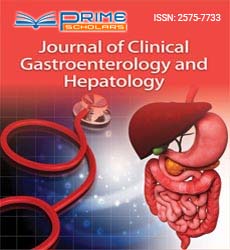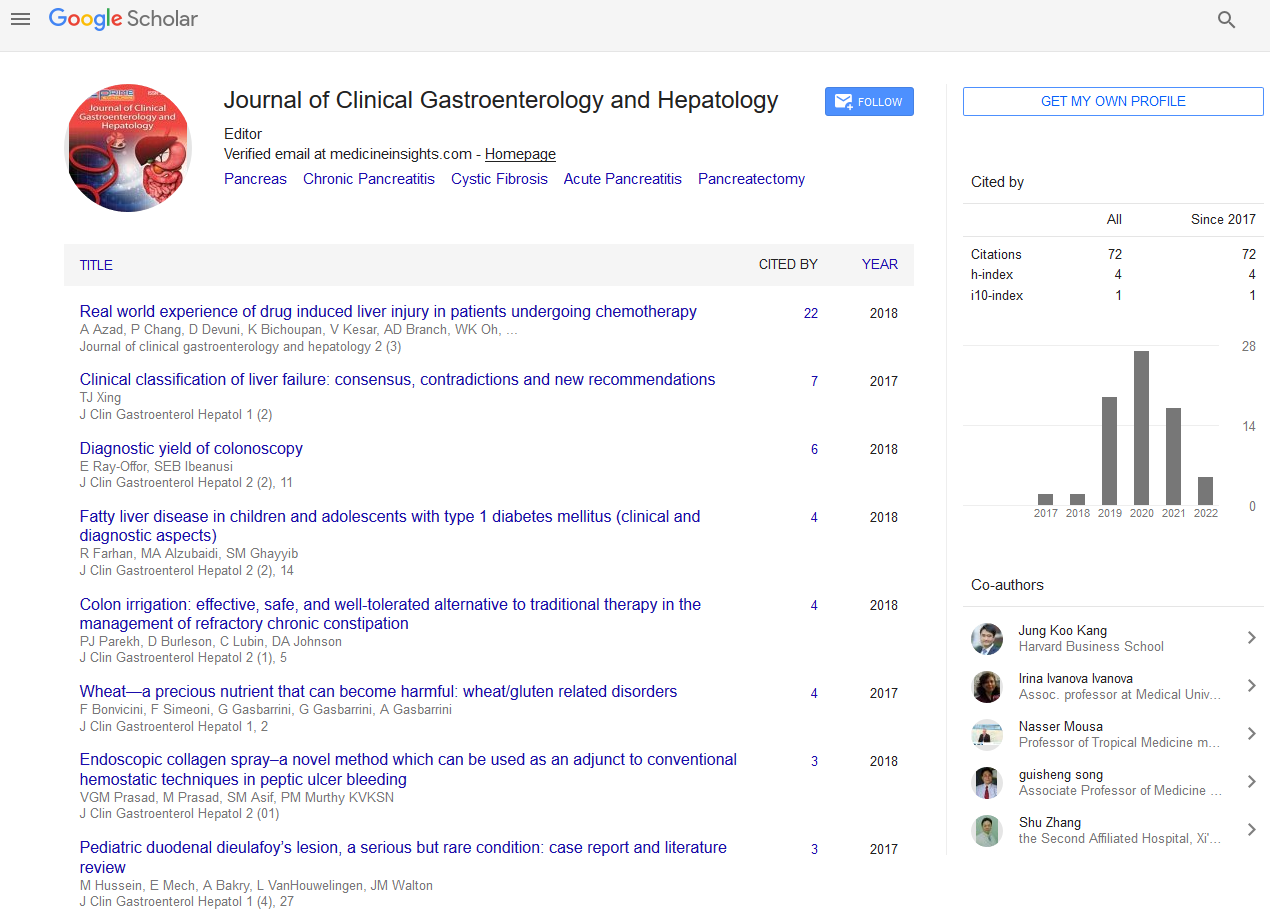Short Communication - (2022) Volume 6, Issue 2
Fundamentals of Hepatology
Ayan Rand*
1Department of Hepatology, Royal University of Bhutan, Bhutan
*Correspondence:
Ayan Rand, Department of Hepatology, Royal University of Bhutan,
Bhutan,
Email:
Received: 31-Jan-2022, Manuscript No. IPJCGH-22-13064;
Editor assigned: 02-Feb-2022, Pre QC No. IPJCGH-22-13064 (PQ);
Reviewed: 16-Feb-2022, QC No. IPJCGH-22-13064;
Revised: 21-Feb-2022, Manuscript No. IPJCGH-22-13064 (R);
Published:
28-Feb-2022, DOI: 10.36648/2575-7733.6.2.10
Introduction
Hepatology is a part of medication worried about the review,
avoidance, finding, and the board of infections that influence
the liver, gallbladder, biliary tree, and pancreas. The word hepatology
is gotten from the Greek words “hepatikos” and “logia,”
which signify liver and study, individually. Hepatology was recently
viewed as a subspecialty of gastroenterology; nonetheless,
these days’ specialists can work in hepatology, which is
rapidly arising as a detached claim to fame. As a basic organ
that can be impacted by an enormous number of variables, the
liver is typically the point of convergence in hepatology.
Description
Proof from dissections on Egyptian mummies recommends that
liver harm from the parasitic disease bilharziasis was boundless
in the old society. It is conceivable that the Greeks might have
known about the liver’s capacity to copy as delineated by the
account of Prometheus dramatically. Be that as it may, information
about liver sickness in days of yore is sketchy. The greater
part of the significant advances in the field has been made in
the last 50 years. There has been a colossal development in
information assortment in hepatology in the course of the last
ten years. This abundance of “large information” fits the use of
man-made brainpower in the advancement of prescient and
demonstrative models with possibly more prominent precision
than standard biostatistics. As handling force of registering
frameworks has improved and information are made more
available through the huge data sets and electronic wellbeing
record, these more contemporary strategies for breaking down
and deciphering information have gathered a lot of interest in
the field of medication.
It is fundamental to characterize and approve the best calculations
to analyze and treat liver sicknesses, in actuality, comparably
to numerous different circumstances, to help patients to
deal with their own liver pathologies, to stay away from clinical missteps, and work on monetary manageability by diminishing
medical services costs connected with liver illnesses.
Their adequacy in the treatment of metabolic related greasy
liver infection has been shown both in exploratory models and
in clinical preliminaries, yet their impact on the anticipation
of this sickness has not been portrayed. The helpful impacts
of probiotics in alcoholic liver illness have been displayed in
numerous exploratory investigations; however there are not
many clinical preliminaries to help these discoveries. The impacts
of probiotics on the course of other liver sicknesses are
either ineffectively examined, for example, essential sclerosing
cholangitis, ongoing hepatitis B and C, and immune system
hepatitis or not learned by any means, for example, essential
biliary cholangitis, hepatitis An and E, Wilson’s infection, hemochromatosis,
capacity illnesses, and vascular liver illnesses.
Consequently, regardless of the advancement in the investigation
of probiotics in hepatology throughout the most recent
ten years, there are numerous neglected and indistinct inquiries
encompassing this theme. Infections and entanglements
connected with viral hepatitis and liquor are the fundamental
justification for looking for expert guidance. Multiple billion
individuals have been contaminated with hepatitis B infection
eventually in their life, and roughly 350 million have become
tireless carriers.
The reconciliation of computerized reasoning (AI) and expanded
real factors into the clinical field is being endeavoured by
different analysts across the globe. In actuality, the vast majority
of the trend setting innovations used by clinical suppliers
today have been acquired and extrapolated from different
ventures. The presentation of AI into the area of hepatology
and liver medical procedure is generally a new peculiarity. The
motivation behind this account audit is to feature the different
AI ideas which are right now being attempted to work on
the consideration of patients with liver illnesses. We end with
summing up arising patterns and significant difficulties later on
advancement of AI in hepatology and liver medical procedure.
There are two options when it comes to picking a hepatitis expert:
a gastroenterologist or a hepatologist. Both have the ability
to treat liver diseases, but their preparation methods are
quite different. Understanding these distinctions can help you
make a more informed decision about which to choose [1-4].
Conclusion
A gastroenterologist is a board certified specialist in both internal
medicine and gastrointestinal. To obtain the final certification,
they must complete a long term association in gastroenterology,
which entails a comprehensive examination of
difficulties affecting the gastrointestinal system’s organs such
as liver, stomach, digestion tracts, pancreas, and gallbladder.
A hepatologist is trained to treat problems with the liver and
its accompanying organs, such as the pancreas and gallbladder.
Although there is no specific confirmation test for hepatology,
there is intensive one and two year associations during which
an expert in training get broad exposure to a wide range of liver
issues.
Acknowlegement
None
Conflict of Interest
Authors declare no conflict of interest.
REFERENCES
- Rivera H, Panduro A (2018) Financial and other competing interests: Be aware. Ann Hepatol, 17 (6), pp. 897-898
[CrossRef] [Google Scholar] [Scopus]
- Panduro A, Roman S (2016) Need of righteous attitudes towards eradication of hepatitis C virus infection in Latin America. World J Gastroenterol, 22 (22), pp. 5137-5142
[CrossRef] [Google Scholar] [Scopus]
- Filardo G, da Graca B, Sass DM, Pollock BD, Smith EB et al. (2016) Trends and comparison of female first authorship in high impact medical journals: Observational study (1994-2014). BMJ, 352, p. i847
[CrossRef] [Google Scholar] [Scopus]
- Tsugawa Y, Jena AB, Figueroa JF, Orav EJ, Blumenthal DM, et al. (2017) Comparison of hospital mortality and readmission rates for Medicare patients treated by male vs female physicians. JAMA Intern Med, 177, pp. 206-213
[CrossRef] [Google Scholar] [Scopus]
Citation: Rand A (2022) Fundamentals of Hepatology. J Cancer Epidemiol Prev. 6:10.
Copyright: © Rand A. This is an open-access article distributed under the terms of the Creative Commons Attribution License, which permits unrestricted use, distribution, and reproduction in any medium, provided the original author and source are credited.

